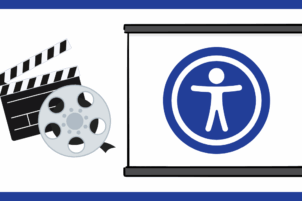“If you do this, you’re just as bad as you think I am.”
“I’m worse.”
“Do No Harm,” directed by Aiden Keltner and starring creator, writer, and producer Fay Kanesvsky as Heather, highlights the damage caused by medical sexism, neglect, and ableism in just five minutes. Disability Belongs™ Entertainment Lab Alumna Liz Galalis was one of three writers who worked on the project.
The film puts viewers in the room with Heather and Matt (Henry Hetz), as their first date winds down in the former’s living room. Tensions rise after a TV news story breaks about another body found in a dumpster and Matt insists on staying with Heather despite her not-so-subtle hints to leave her home.
Keltner uses cool-toned, low lighting to craft a suspenseful, even gloomy, atmosphere as viewers become uneasy with Matt remaining in Heather’s home and infantilizing her, stating that she cannot protect herself as a disabled woman with a serial killer on the loose. Kanesvsky brings authenticity to their role as a disabled person and mobility aid user off-screen. The film’s music keeps viewers on edge as they try to determine what happens next. For a few minutes, viewers are left guessing who the real danger is between the couple. Music is also used well to create an element of dark humor, as an upbeat tune plays at the end of the film while a body is disposed of in broad daylight.
“Do No Harm” excels at telling a complete story in a tight time limit without feeling rushed. Further, the thriller flips typical narratives of disability in the genre. Instead of disability being framed as a punishment or as something to be afraid of, those who mistreat disabled people are punished for their wrongdoing. Viewers may identify with Heather’s desire for justice for herself and the three women who died because of the same doctor’s negligence; Heather aims to prevent the doctor from hurting anyone else, no matter what it takes. For those who have faced neglect, sexism, or ableism from medical professionals, the film can serve as a cathartic experience.
The film was produced as part of this year’s Easterseals Disability Film Challenge (EDFC), an annual five-day competition, founded by Nic Novicki, in which filmmakers must create original three-to-five-minute films based on a different theme each year, with this year’s theme spotlighting thriller and suspense.
This review was written by Disability Belongs™ Operations/Accessibility, Inclusion, and Belonging Fellow Félix Moreno and edited by Disability Belongs™ Entertainment and Media Fellow Aaron Potter.








Nicely written!